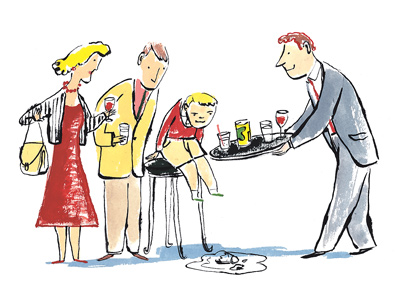I approached one of the original Johns on his way back from the men's room. "Look," he said, when I asked him, per the manual, if there was anything I could do to make his evening more enjoyable, "we're both grown-ups. Things could be better, but as far as I'm concerned, they can talk with someone else, they can sit on the lap of someone else, they can kiss someone else, but at the end of the evening they're coming home with me."
Then he hugged me. I was on his side.
In many ways, being in an atmosphere of enlightened hospitality is like going to work inside your mother's fantasy of how the world should be. You stand up straight, smile, and say "please" and "thank you" a lot. You do this when you're tired, when you're annoyed, when your feet hurt so much you could cry, and when you can't believe the woman at Table 47 is wearing that halter top with that skirt. But you don't say anything.
To be a server or host at a top-drawer restaurant is to mind your p's and q's-for a living. (One of my proudest moments occurred when I seated a woman wearing a peanut-butter-colored bouffant the shape of the headdress on the Giza Sphinx. Another woman stepped out of the ladies room, took one look at the glazed helmet approaching, and nearly burst into guffaws. I resisted the temptation to flash her a conspiratorial smile, and proceeded as if I were seating an old friend.)

If anything, one develops a sense of pride at giving guests more than they expect. One evening, as I seated three Wall Street types, I overheard one saying, "Hey, did you read that restaurants are starting to turn tables faster?" I relayed this to their server, who said he would let them know they could stay as long as they wanted. We chuckled knowingly. This job is like the revenge of Goody Two-Shoes, I thought; you can tattle on someone and make their day at the same time.
"When you first start working here," said Lauren Glazer, a former singer turned manager, "you begin to realize that often the nicest things we do for guests are things they don't even know about."
In fact, the more I did for the customers, the more I became myself-cutting up, having short conversations, engaging. I liked the gamesmanship of it (So you don't like your table? Fine. I'll just walk back down, then up, then down those steps again carrying your FOUR Martinis, and give you a different table) and I liked the teamwork of it ("You just watched a guest give his date the Heimlich? What did you do with the regurgitated spinach?"). With the employees all acting like themselves-quiet or loud, friendly or reserved-the atmosphere in the restaurant becomes, well, democratic.
Over time, I began to see this atmosphere as something of a milestone. In Europe, the service model-particularly as it was exported to the U.S. in the form of stuffy French restaurants-has been one in which the server is superior to the servee. In Asia, the model is one in which the server is subservient to the servee.
But American service, like America itself, takes elements of European hierarchy, mixes them with a Protestant work ethic, then tosses in certain elements of our culture that we forget are revolutionary: equality, informality, social mobility, and, above all else, fun. It's hard to condescend to a server-or feel intimidated by one-when he or she could be your child, your neighbor, or even yourself back in college.
"In terms of value, the roles are equal," says Paul Bolles-Beaven, an effervescent, goateed sprite of a man whose wife, father, and father-in-law are all Episcopal priests. "The serving role is an honorable one. I'm slipping into Jesus mode here, but 'I am among you as one who serves.' "
And therein lies the secret: Good service, as achieved in America, is a dialogue between equals, where each side respects the other and goes away fulfilled-and served. If a guest wants to check a surfboard (as one did with me), he can. If a guest wants to return a $300 bottle of wine, he can (if it's deemed drinkable, it will be served at the bar). One night, I went to take a young couple waiting at the bar to their table. "You can settle your tab," I said, "or we'd be happy to transfer it."
"You can do that?" the man said.
"Most places don't let you," the woman echoed.
"Well, you're at Union Square Cafe," I said.
I relayed this story to Bolles-Beaven. "I don't understand why more restaurants don't do this. People are more important than policies." He smiled and spun on his heel, "Just another quotation from Chairman Paul."
On my last night, I went to seat two couples at Table 24, carrying two glasses of red wine they had ordered at the bar. After they were seated, I reached to place a glass in front of one of the women. As I did, I felt the glass remaining on my tray slide toward the table. This was the one situation I was most curious about when I started. What would I do if I spilled a glass of red wine down the back of the woman's yellow dress?
By this point, I had memorized the manual and knew the procedure. Try club soda. If that fails, try white wine. "If the stain still won't come out, offer a sincere apology, retain your composure, and tell the guest that we will gladly reimburse them for dry cleaning costs."


 Pinterest
Pinterest






